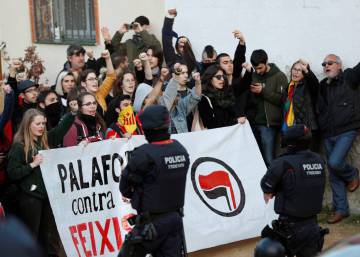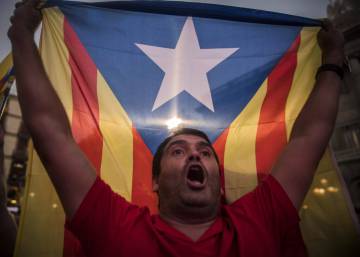Ousted Catalan premier released from German prison on €75,000 bail
Court in north of country has freed Carles Puigdemont while it continues to study extradition request from Spain over his role in independence drive

Catalonia’s former premier Carles Puigdemont greets the media as has leaves prison in Neumuenster, Germany on Friday. FABIAN BIMMER REUTERS
Madrid / Neumünster
Ousted Catalan premier Carles Puigdemont was released from custody on Friday by the German authorities on €75,000 bail, while the country’s justice system continues to study a request for his extradition issued by Spain.
The release came after a court in Schleswig-Holstein in the north of Germany ruled out the offense of rebellion included in Spain's extradition request against Puigdemont. The former Catalan premier was arrested in the country last month after arriving there from Denmark, and is wanted by the Spanish authorities for his role in last year's unilateral declaration of independence, which was passed in the regional parliament of Catalonia.
German court said that it could not accept extradition for rebellion for “juridical reasons”
According to news agency Reuters, citing a court spokesperson, Puigdemont will not be able to leave Germany while the European arrest warrant against him is processed, and he will have to register once a week at a police station.
Puigdemont, who was incarcerated in Neumünster in the north of the country for 12 days, spoke to the press as he left the prison. He called for the immediate release of the other pro-independence figures who are still behind bars, calling it “shameful that there are political prisoners.” He added that he had always trusted in the European justice system, which he said was committed to human rights and the seperation of powers.
“We called for dialogue in recent years, and we have only received a violent and repressive response,” he added. “It is time for politics.”
Earlier in the week, public prosecutors in the German state of Schleswig-Holstein had formally requested that Puigdemont be extradited to Spain, where he is wanted by the justice system for rebellion and misuse of public funds. They had also requested he remain behind bars as they consider him a flight risk.
According to a statement released by the court, judges have ruled that the offense of rebellion is “inadmissible,” but that the corruption charges could stand, meaning Puigdemont still may be extradited back to Spain. While the court admits that there is still a flight risk, it said that ruling out the offense of rebellion reduces this considerably.
Puigdemont will be released from custody by the German authorities on €75,000 bail
Questions had been lingering over the nature of the charges against Puigdemont. Under “double criminality” regulations, the state receiving the extradition request must recognize the same crimes in its own criminal code. Whereas the concept of misuse of public funds exists as such both in Spain and Germany, the Spanish notion of “rebellion” has no exact match, although legal experts had said it might be construed as the equivalent of “high treason” in Germany.
The German court on Thursday stated that for “juridical reasons” it could not accept extradition for rebellion in accordance with the Spanish penal code, given that “the acts for which he is being charged would not be punishable in Germany according to the current legislation here.” Articles 81 and 82 of the German penal code state that there has to have been an element of violence or threat of violence. The court decided that the Spanish offense of rebellion does not equate “high treason,” given that there was no element of violence in the alleged acts committed by Puigdemont.
“What is required is that violence put such pressure on a constitutional organ that the will of the latter is crushed and that is not the case here,” the court stated in a press release, in which it cited previous jurisprudence.
“As the instigator of the referendum, the violence that took place on the day of the vote can be attribute to [Puigdemont],” the statement continues. “But these violent acts did not take the form, the scale nor the sufficient effect to exert such pressure on the [central] government that it had to capitulate in the face of the demands of the violent person.”
That’s to say, that the German court considers that the pro-secession movement did fuel acts of violence, but given that they did not force the state to bend, this cannot be considered a case of rebellion or high treason under German law, thus obstructing Puigdemont’s extradition on that charge.
The German judges also rejected that Puigdemont could be a victim of a political persecution in Spain, as the defense had argued in a bid to have the extradition order quashed.
PUIGDEMONT FACING UP TO 12 YEARS FOR MISUSE OF PUBLIC FUNDS
JOSÉ ANTONIO HERNÁNDEZ, MADRID
In the wake of the German courts’ decision on Thursday, the Spanish Supreme Court will seek to avoid any appeals with the country’s justice system and bring former Catalan premier Carles Puigdemont to Spain as soon as they have the green light to do so. With the judges in Germany having ruled out the accusation of rebellion against Puigdemont in Spain’s extradition request, they hope to do so on the basis of misuse of public funds, which can be punishable by up to 12 years in jail, according to sources from the Spanish Supreme Court.
The same sources say that it is inexplicable that such a court in Germany – one that would be equivalent to a provincial court in Spain – could make such a ruling without having the direct evidence with which the Spanish Judge Pablo Llarena used to form the accusation against Puigdemont of rebellion.
The Spanish Supreme Court argues that the German judges should have only gone so far as to verify whether the facts described by Llarena in his writ – including police reports that accredit more than 300 violent acts during the secessionist drive – are included under German penal law. Earlier this week the public prosecutors dealing with the case in Germany called on the judges to extradite Puigdemont both for misuse of funds and rebellion, which would be equivalent to high treason under German law.
Supreme Court sources say that they will observe the limitations imposed by the German court and will not try Puigdemont for rebellion, just for aggravated misuse of funds. Judge Llarena has so far accounted for €1.6 million of funds misspent by the secessionist leaders.
Under Spanish law, amounts exceeding €250,000 in relation to this offense can be punished by up to 12 years in jail.
English version by Simon Hunter.









































No hay comentarios:
Publicar un comentario